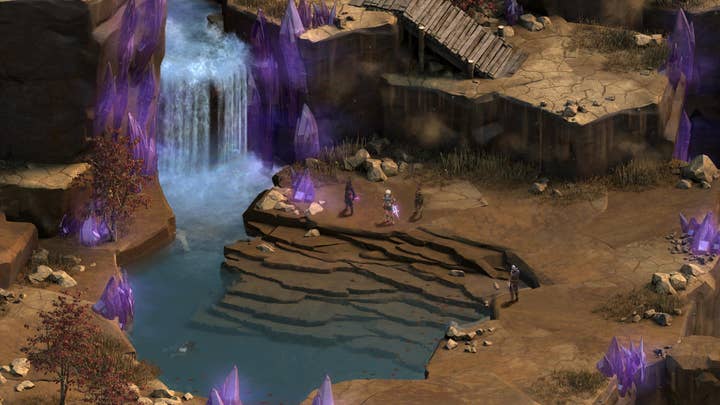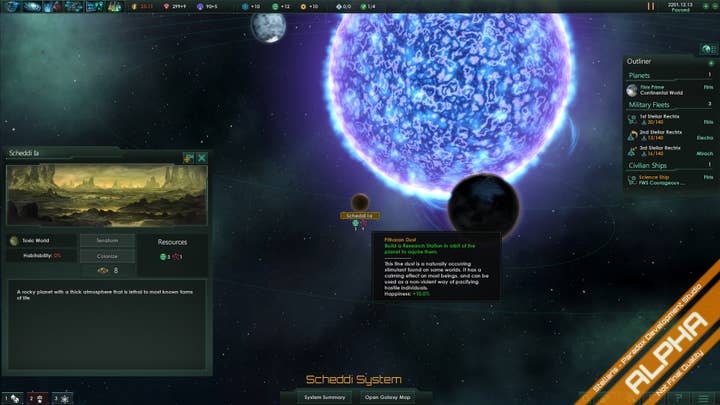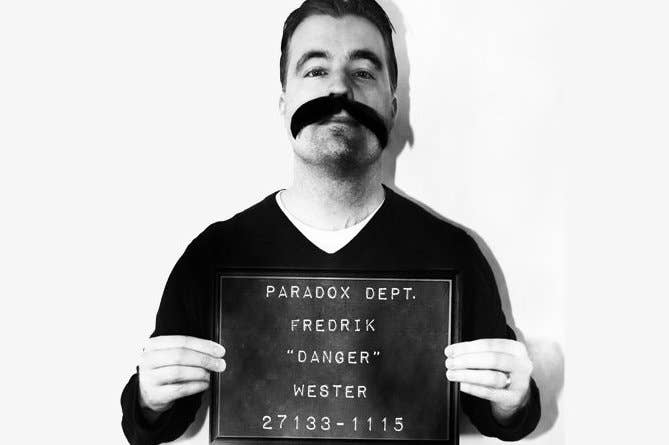"Bungie has a deal with Activision for 20 years or something. We would be interested in doing something like that"
Paradox is on the eve of an IPO, but Fredrik Wester isn't looking to settle down
Last time I sat down with Fredrik Wester, at 2014's E3, he told me that 2015 was going to be Paradox's year, and he was right. In terms of sales and critical success, Cities: Skylines and Pillars of Eternity set new targets for the company, established new partnerships and reached new audiences without betraying the niche focus which has been the furnace at the heart of the company's engine.
So what better time to go public than riding the high of your most successful year yet? I'm told by Paradox's CFO that Swedish law prevents them from talking about plans in much specific detail, but Wester has, in fairly typical style, already confirmed that it's something he wants to happen in 2016, reassuring fans about the company's future with a couple of choice Churchillisms. Sitting down with Wester in the Samovar tea rooms towards the end of a busy GDC, it seems like a decent place to start the conversation.
"Our main plan right now is to float the company on the stock exchange, but all the details aren't set," he says, supping some sort of exotic Rooibos. "We're ready for it as a company, and we've taken all the measures and all the reporting details and everything, but all in all, the most important thing for me right now is that I'll still be the biggest shareholder and still be running the company, and so I'll have the same majority share as I had before. So it is really more a way to let people in on the journey that is Paradox Interactive."
"Our main plan right now is to float the company on the stock exchange, but all the details aren't set. We're ready for it as a company."
That sounds a little like a marketing soundbite, which rings a little oddly from someone as frank as Wester, so I press a bit on the potential risks. Surely as a niche publisher, even one doing so well, there's a danger that shareholders might want to pull the company's portfolio in more predictable directions, to ask "why are you making Crusader Kings instead of Call of Duty?" Wester is confident that these aren't the sort of shareholders they'll be bringing into the fold, also confiding that the IPO will "not primarily be targeting institutions."
"We've said this to everyone who comes on board at Paradox," he continues. "'If you believe we're on the right track...,' When my business partner was bought out six years ago, we brought in an investment company, the ones who are now the second biggest owner after myself. One of the key things that was important to us was that they would not interfere in operational tasks, like what kind of games we do, what kind of people we hire, what the culture is at Paradox. So if they trust us as a company, as a management team, to build different gaming teams and to deliver something great, they should invest and buy my business partner out. Otherwise they should just stay away. And that is something I've repeated a lot of times too. We brought in a new owner two years ago in May who bought some shares, and we had the same walkthrough with him, saying, 'If you think we can do a good job going forward, then...'

"I'm never making estimations for coming years because if you look historically at what Paradox has produced in the past and you see the growth we've had organically in 13 years, and you think that we can still continue to produce great results, well, great, that's what we think ourselves. But I will never go out and say, 'We're gonna grow by 20 per cent this year,' or, 'We're gonna do this, we're gonna do that.' I'm cautiously optimistic by nature, but I'm also aware that there are a lot of ups and downs in the gaming industry. That is basically the philosophy behind the company, and it's rooted deep, not only on the business side but in the games side as well. We run things by letting smart people do what they're best at doing and not having me interfere in what they're doing, because if I meddled in game design and a lot of other things, it would go badly. The more I moved away from the operational game decisions, the better games we started producing. And that's a valuable lesson for me to learn."
"The worst thing that can ever happen for a company is that you get locked into your own business model and you stop innovating on that, because after a while you'll get trapped in a business model where your customers never allow you to change"
Retaining a majority stake pretty much settles the argument of whether Wester retains the final say, but surely there must be a part of him that sometimes considers a slight shift to the mainstream. Given the triumphs of Cities, a game which is still niche, but probably less so than, say, Hearts of Iron, has the last year softened his resolve? Has there been any unrest amongst the company's vocal and engaged fanbase?
"I think what you're saying people are fearing, that we're going more mainstream and that we're not sticking to our guns, I don't think there's a need to fear that, because we're still experimenting a lot. My speech tomorrow is about business models and value propositions and value design for games - how business model design and game design goes hand-in-hand, and the worst thing that can ever happen for a company is that you get locked into your own business model and you stop innovating on that, because after a while you'll get trapped in a business model where your customers never allow you to change it because there will be an outrage among the core fans and they will abandon the game, or there will be a slight decline because you're not inventing new things in the game and it will still die because of that.

"So keeping the pace all the time is what game design and business design is about. That is also the philosophy that we have: always experiment, always do new things. It will take Paradox into territory where fans do not feel comfortable or maybe we do not feel comfortable, but we do it to push ourselves to make better products, and if we hadn't made Magicka in 2011, with the success that Magicka had back then, we probably wouldn't have pushed ourselves to make such a great launch of Crusader Kings II, which in turn led to a great Europa Universalis IV, which pushed the boundaries even further. So I think each great release will benefit the next release, even if it's a niche game or if it's a game that goes out to the masses. But our success formula is the niche, and I still consider Cities: Skylines fairly niche."
"Bungie has a deal with Activision for 20 years or something like that. We would be interested in doing something like that with a partner"
On the subject of steering your own destiny, I'm interested to know if Wester plans to follow up the success of 2015 with expansion, perhaps moving outside of Sweden to establish a foreign office, or taking two steps at a time by acquiring a studio. He's got a few options mapped out.
"We have had discussions on where to find talent and how to grow the company, definitely," he says. "It's an ongoing discussion, but so far we spread our risks by signing talented teams that make great games for us, like Colossal Order, like Obsidian and other guys. While we can't hire people ourselves, we can work with established teams that can make really great products, but our next step is logically to look at if we can maybe buy studios or if we can expand in other ways like longer term partnerships. I think Bungie has a deal with Activision for 20 years or something like that. We would be interested in doing something like that with a partner, which maybe would work with a range of IPs or something else. Maybe we say that, 'We're only gonna work on this IP now for eight years, and you're gonna take it further in this direction.' That would be interesting to look at. I don't have any cases like that right now, but definitely it would be something we would consider."
The scope of Wester's comparisons give you a sense of his ambition. Citing one of the biggest pub/dev deals of recent years as a potential blueprint for expansion certainly shows that Paradox isn't wanting for desire, but does he really think it's ready for something like that?
"A game project is a bit like Columbus when he set out in 1492 to go to Asia and all of a sudden he ends up at a totally different continent, and no one knows what to do"
"I think that the biggest challenge in our industry is communication," he says, intensely. "As long as you handle the communication well and you speak to each other and you bring up the problems that the project has...a game project is a bit like Columbus when he set out in 1492 to go to Asia and all of a sudden he ends up at a totally different continent, and no one knows what to do. Everything is just chaotic. And that is the nature of both the game design business and on the business process itself, the business design, if you will. So, every new project is a new Magellan or Columbus or whatever, and shit is gonna happen during those journeys." A smile. "It's interesting times."

